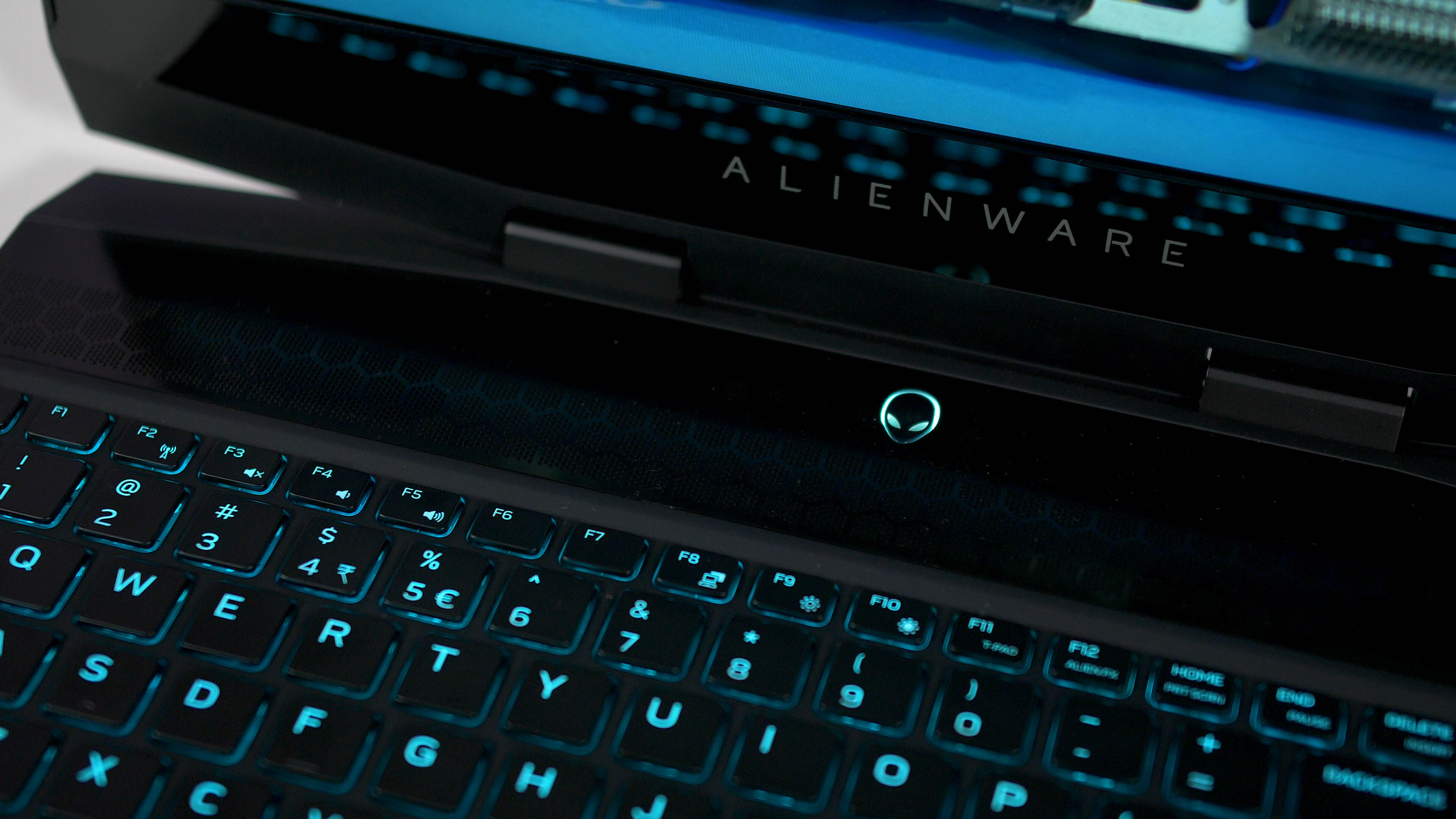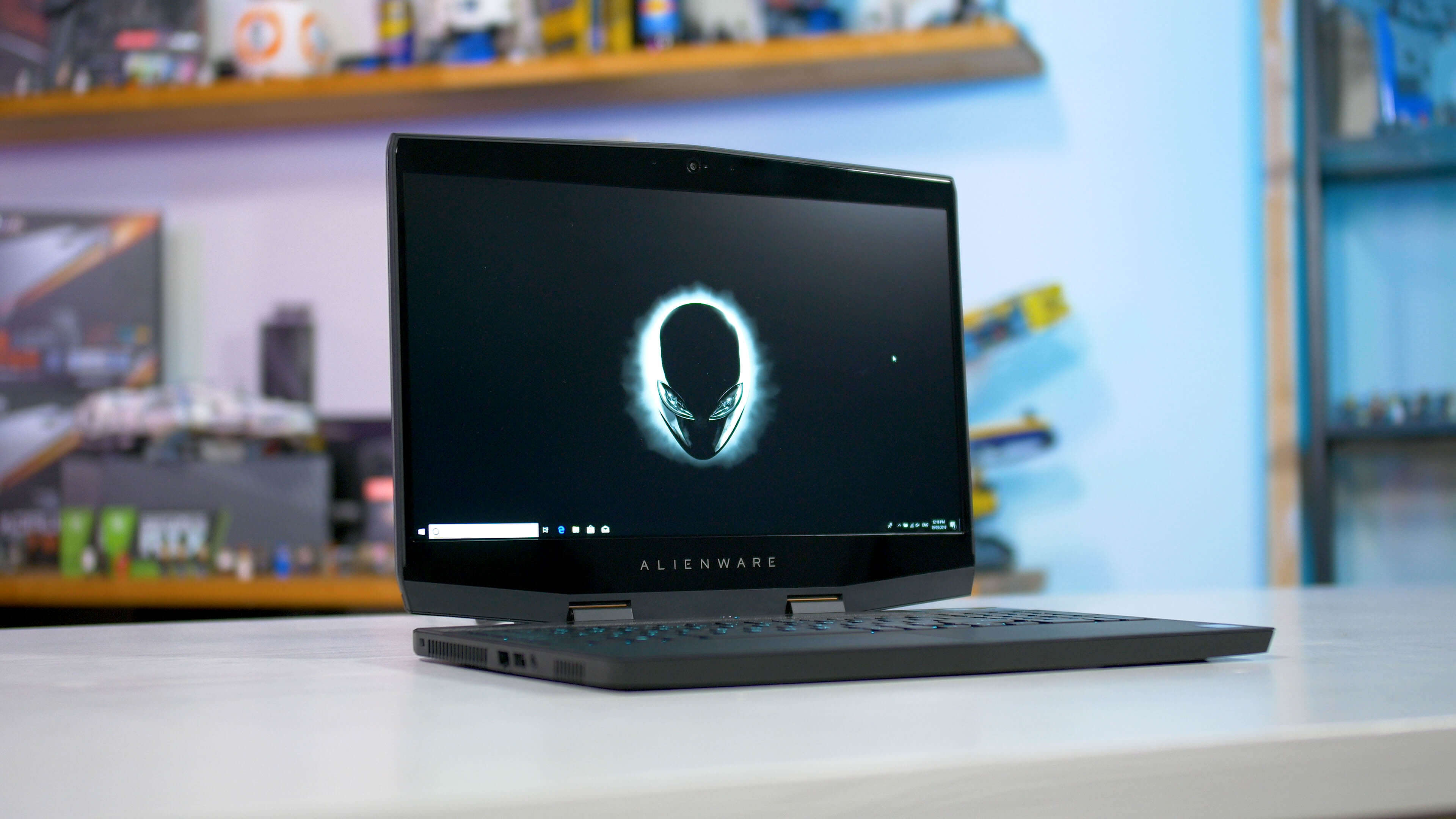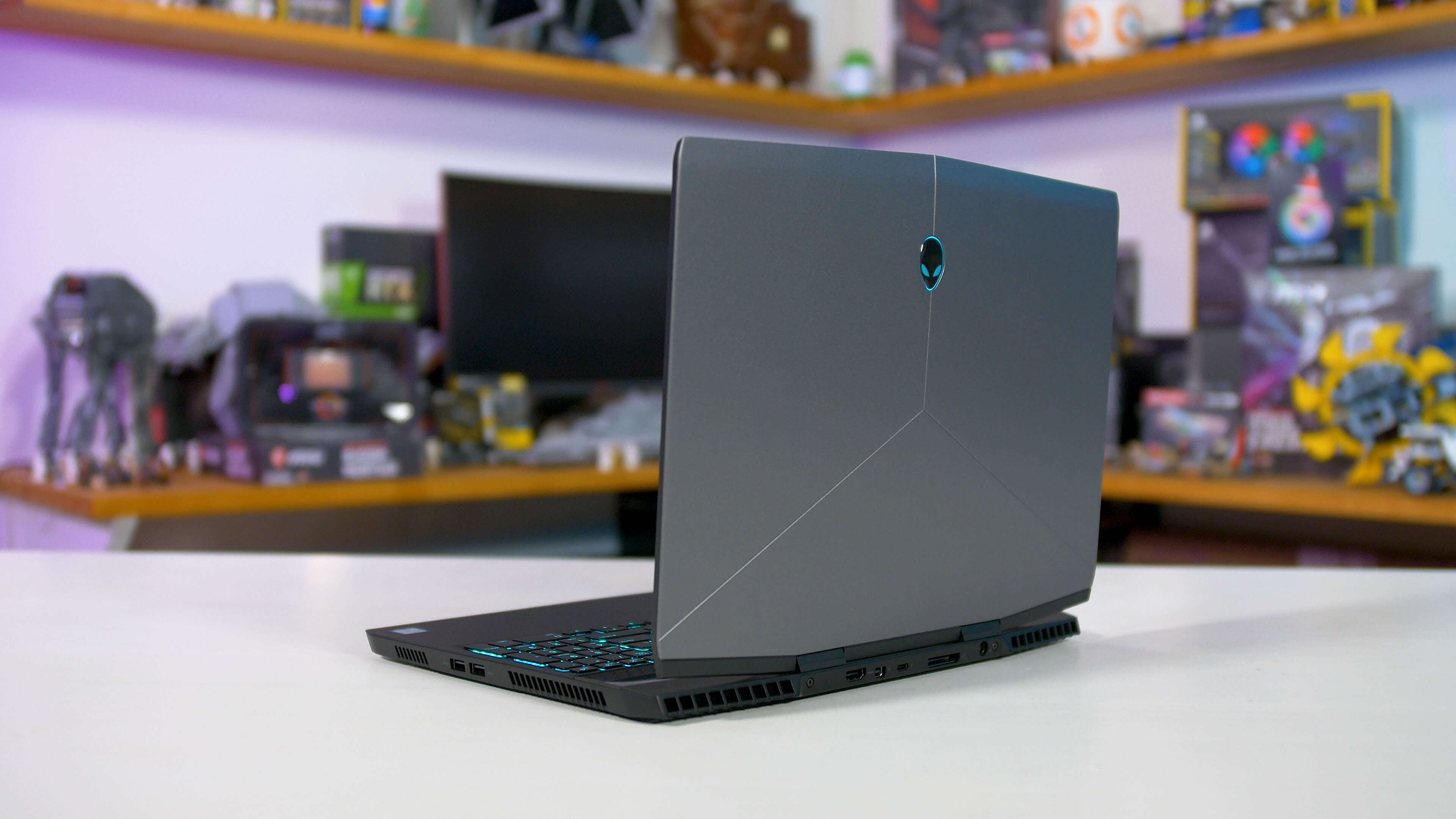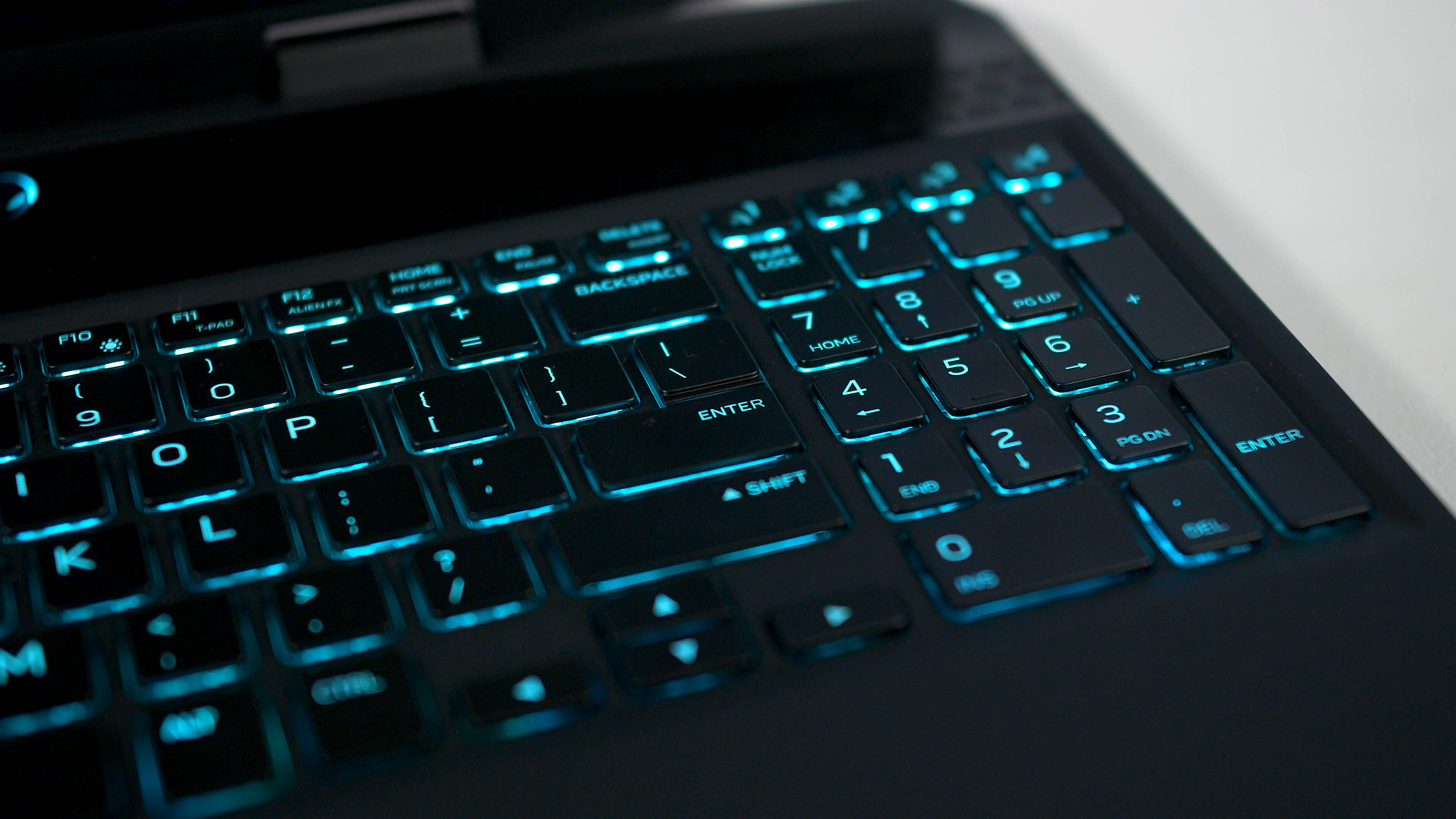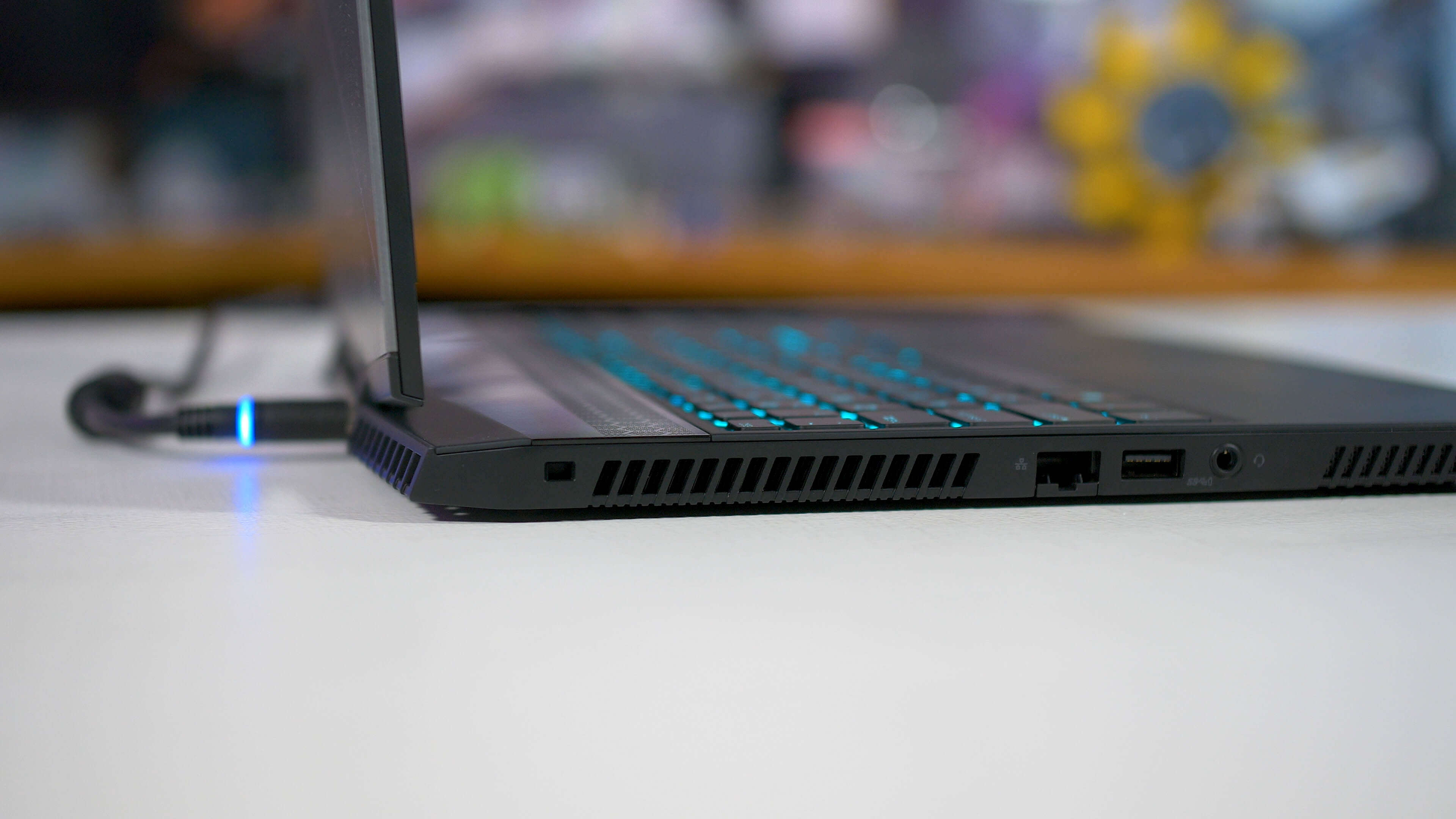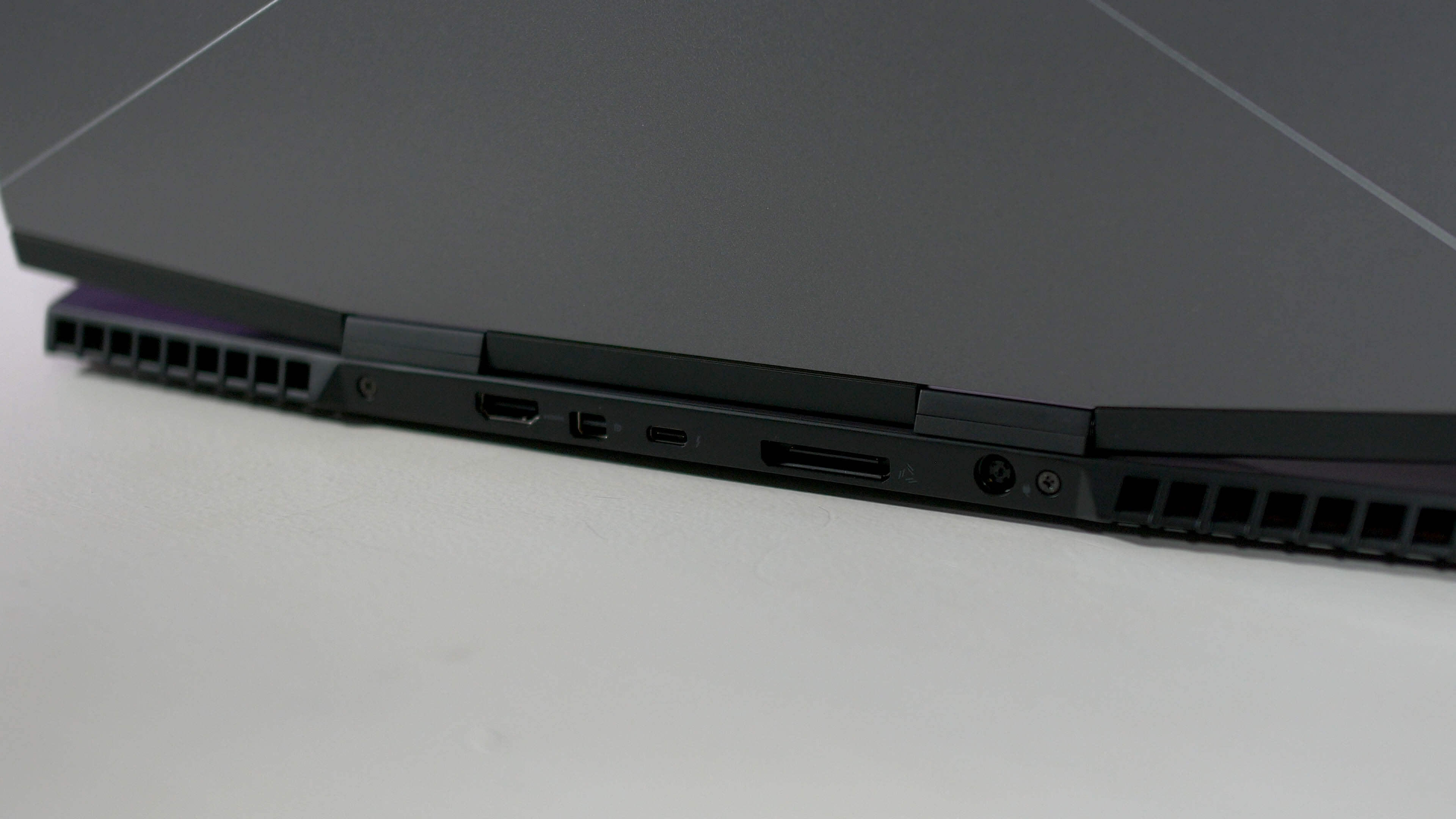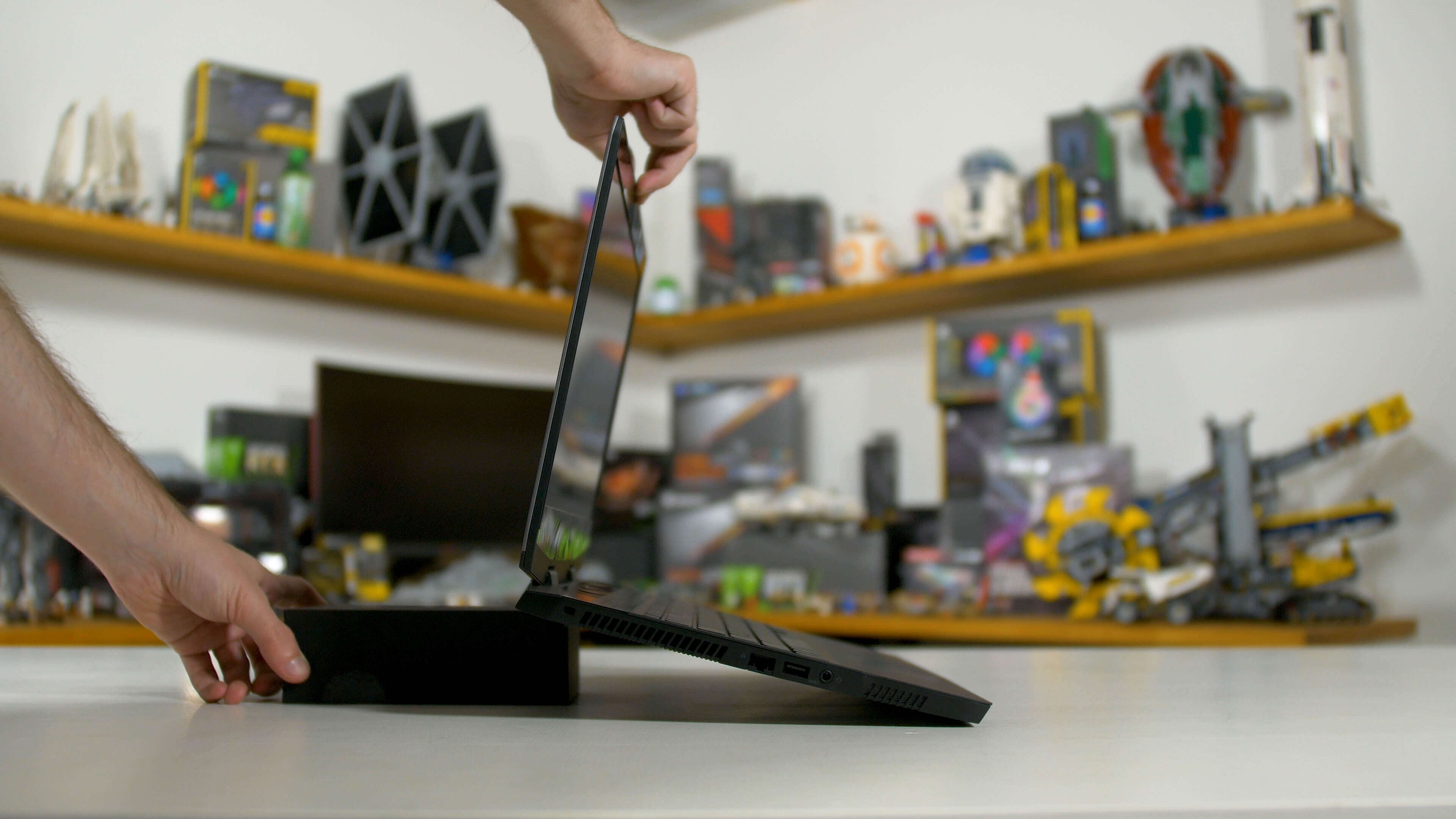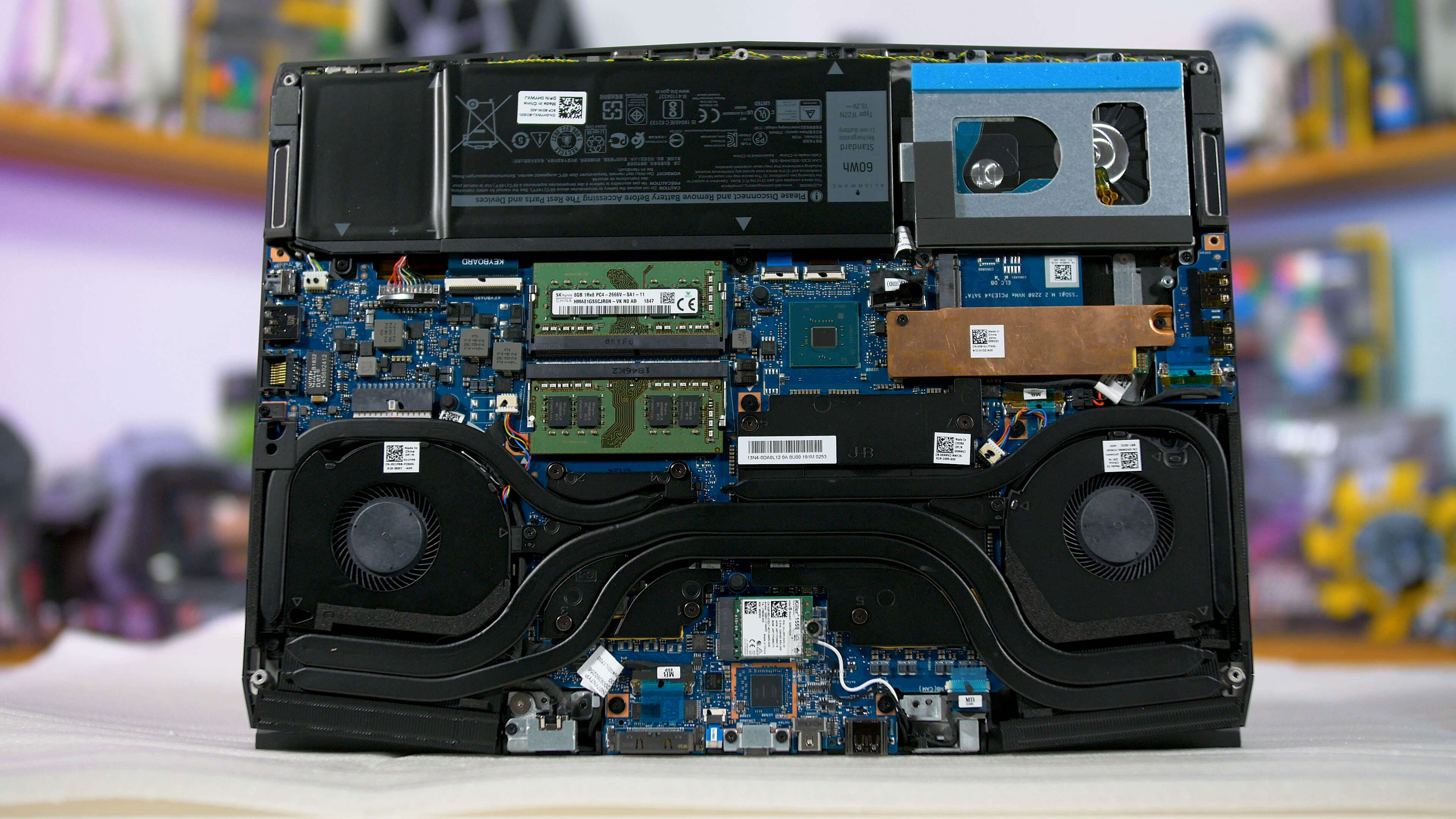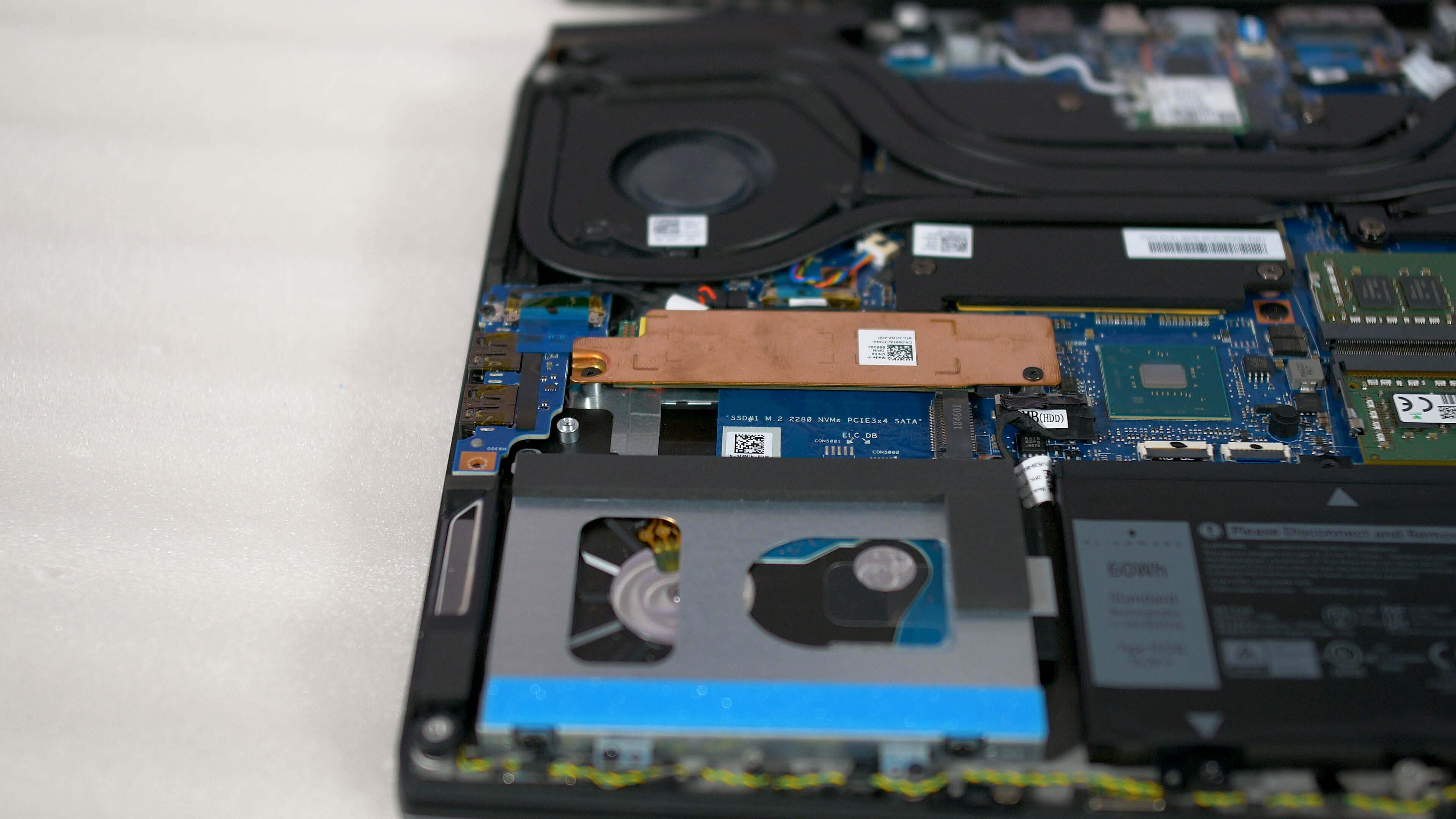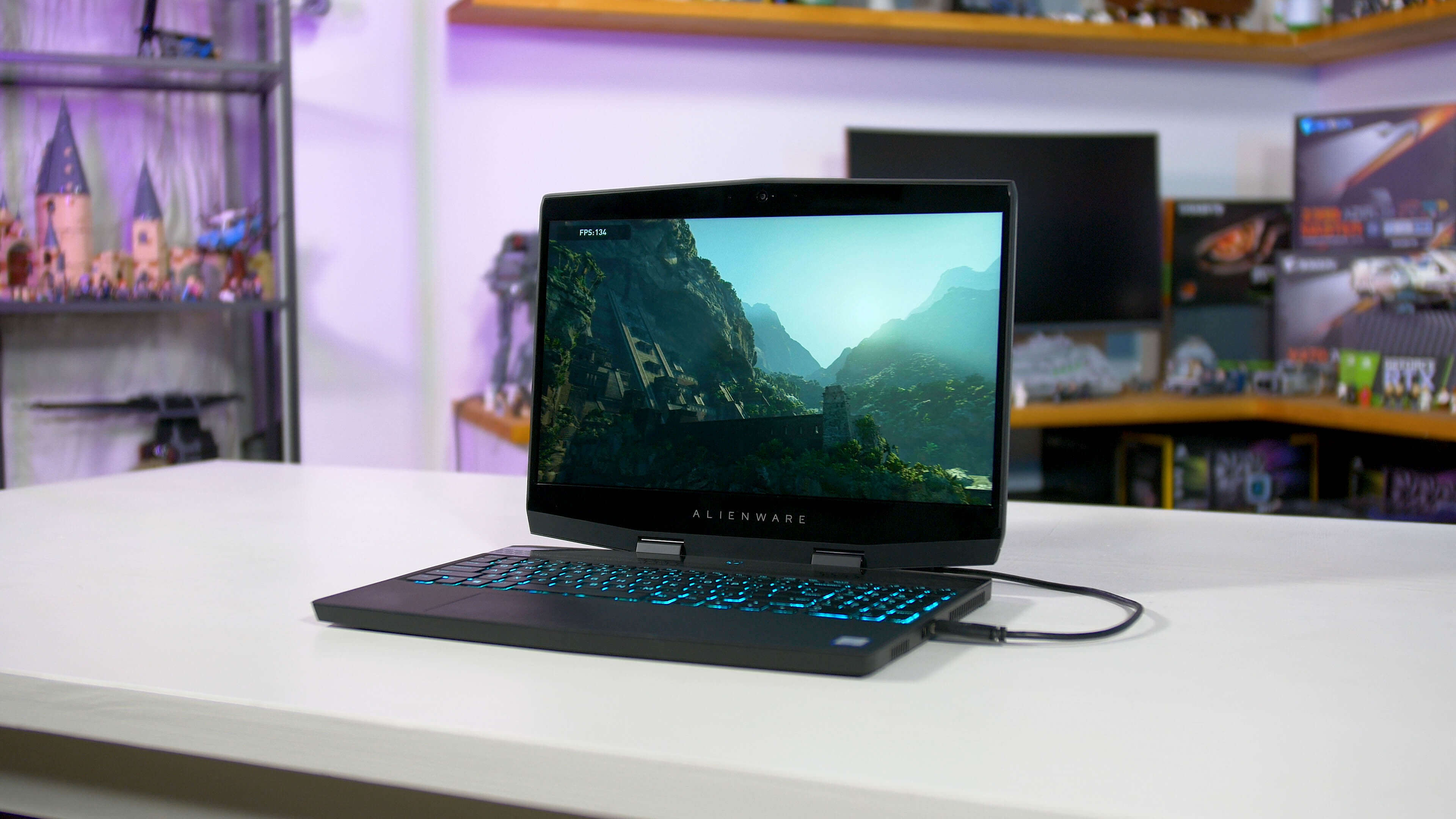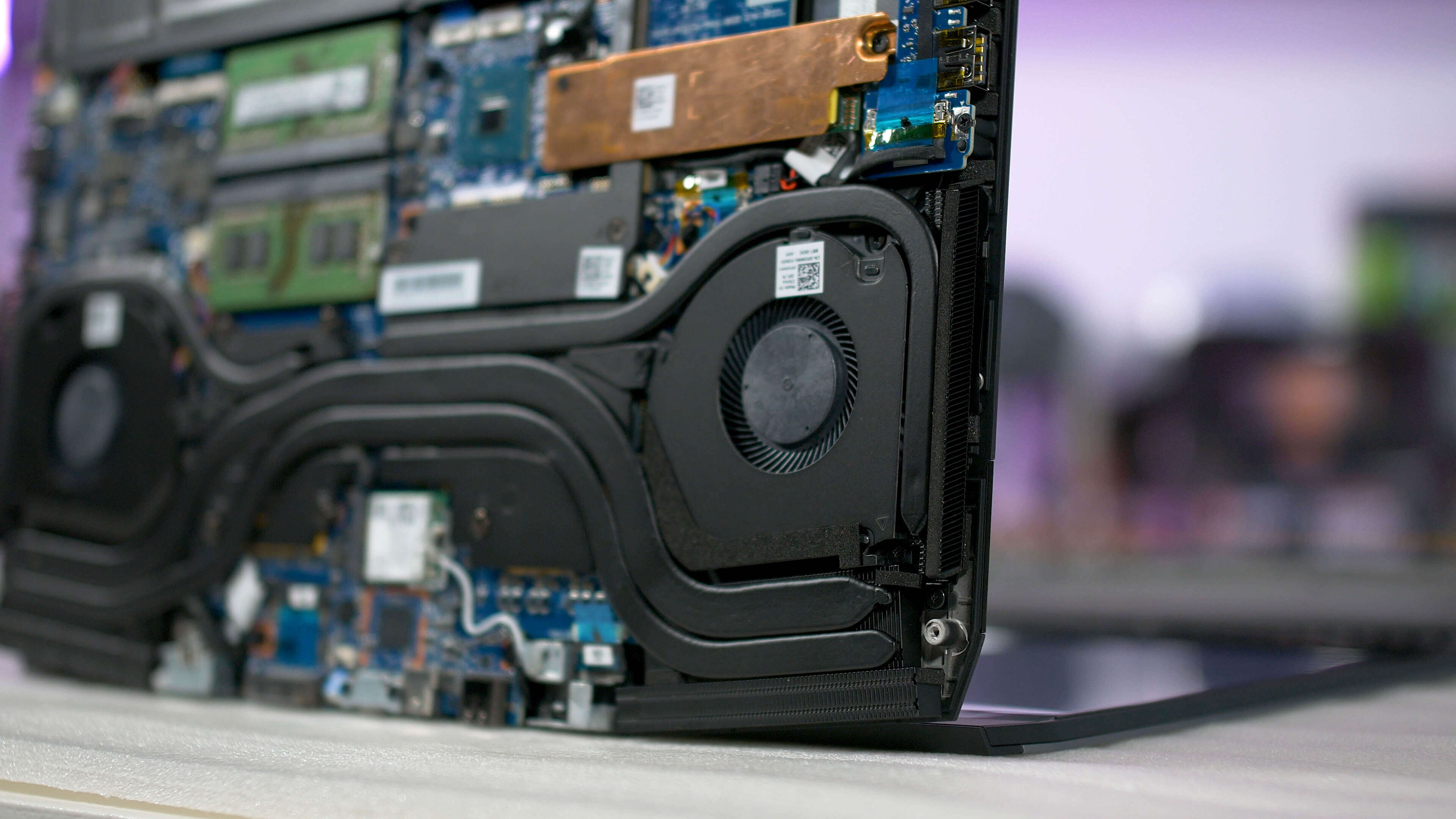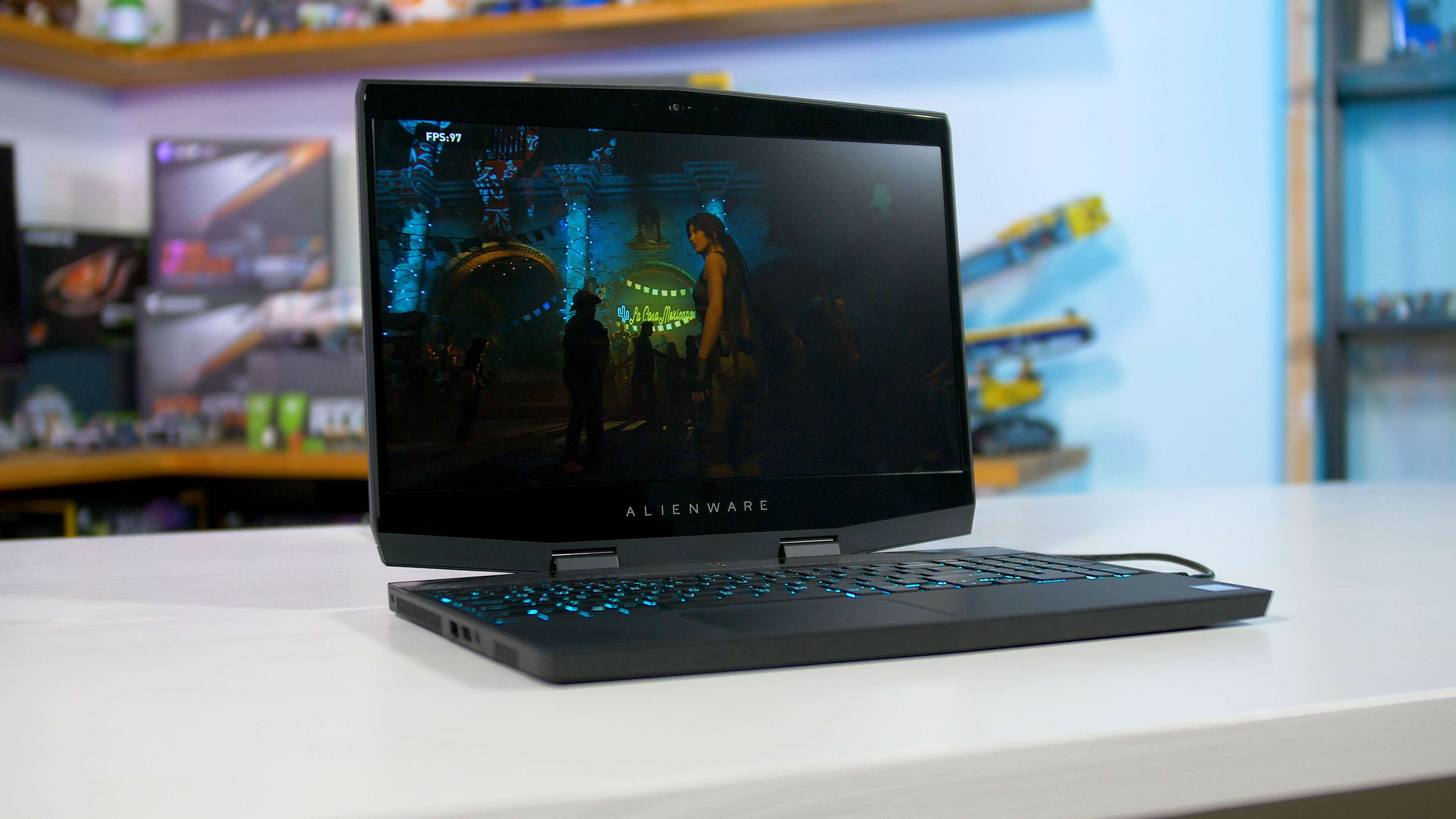Today we're taking a look at another gaming laptop, the brand new Alienware m15, which is the company's portable laptop offering to rival systems like the MSI GS65 Stealth, Gigabyte Aero 15 and Razer Blade. Historically we haven't been huge fans of Alienware's chunkier laptop designs, but the m15 is one of the best we've seen from the company so far.
Let's talk specs to begin with. If you've seen reviews of this laptop from a few months back, those were probably for the original model that used GTX Pascal GPUs. What we're reviewing today is the RTX version, more specifically the RTX 2080 Max-Q model. But there are other options available that might suit your budget better, including RTX 2070 Max-Q and RTX 2060 options.
Like most Dell laptops, the m15 is highly customizable. The CPU for most models stays the same as an Intel Core i7-8750H, but from there you get many storage, RAM and display options. Our review unit came with 16GB of dual-channel DDR4, plus a combination of a 500GB SSD and a 1TB hard drive. The display is a 15.6-inch 1080p 144Hz IPS.
Build and Design
The m15 is Alienware's most portable 15-inch gaming laptop design yet. While this is definitely a good thing, it's probably only good when comparing the m15 to Alienware's other laptops. For example, the regular Alienware 15 is 30mm thick and 7.7lbs heavy (!), whereas the Alienware m15 is about 27mm thick and crucially just 4.8 lbs (2.2kg). The weight difference is massive, which makes the m15 a significantly more portable system.
However if you compare it to say, the Gigabyte Aero 15, the Alienware 15 is larger in all dimensions. Gigabyte's system is only 22mm thick and weighs just a tad over 2.0kg. It's also smaller due to slimmer bezels. The Alienware 15 doesn't give you that awesome slim-bezel design that we've been seeing from other laptops, which keeps it larger than its competitors.
We'd say this new unit is a big step forward for Alienware but it's still got a way to go until it matches the best from its competitors. Something like the MSI GS65 is nearly a pound lighter and for some people that could be a better option.
However, there is no faulting the build quality here, which is superb. This isn't a unibody construction and there are a few different choices of materials, including metal for the lid, a soft touch matte plastic coating around the keyboard, and glossy plastic around the display. But the key here is just how seamless these materials join together, it just feels really solid and well built.
Visually this isn't our favorite design, mostly due to the angular body and a gamery lid. It looks quite nice when opened but it doesn't do enough to take the crown from the elegant MSI GS Stealth line. It's definitely the best Alienware design and the focus on slimness has helped a lot there.
In other areas, Alienware has done a lot of things right. The keyboard has a nice though somewhat spongy tactile response, however the layout is good and it includes a full numpad plus four macro keys. The entire thing is lit up with four-zone RGB backlighting. There's two other RGB elements as well: the power button and alien head logo on the lid.
The trackpad is a little small given the space allocated to it, but it has a nice coating and is very responsive. The speakers are found in the bottom corners of the laptop and they do fine at medium volume but suffer a little bit from distortion at high volumes, if you end up using them at all.
The I/O selection is fantastic, we're getting three USB 3.1 type-A ports, Thunderbolt 3, HDMI 2.0, mini-DP 1.3, a 3.5mm audio jack, Ethernet and Alienware's Graphics Amplifier port. We particularly like that the display outputs are on the rear of the laptop, it's nice and convenient to hook up a display without obstructing either side.
Performance
Let's talk performance, and as always it's important to set the scene with the settings we used. The main consideration are the fan profiles, with Alienware providing four options: Balanced, which is the default, plus Cool, Quiet and Performance modes. We didn't spot any significant difference between the Balanced and Performance modes because both seem to ramp up the fan to the same level while gaming. The Performance mode simply sets the fan to this speed at all times, while Balanced quietens the fan during less intensive workloads. Our recommendation is obvious, to use the Balanced mode and that's what we used throughout this review.

When it comes to CPU performance, knowing that most other flagship gaming laptops rely on the same Core i7-8750H processor, the main consideration was to see whether the Alienware m15 performed any differently in productivity tasks compared to its competitors. What we discovered is that the laptop performs identically to our average 8750H benchmark numbers, suggesting the system is performing as expected. Across each workload it's a little slower some times and a little faster at other times, but on average there is nothing to be concerned about here.

This means we're getting all the usual benefits of the Core i7-8750H. As a six-core CPU, it's ideal for tasks like video encoding, where it's 40 to 50 percent faster than a last-generation Core i7-7700HQ. It's also faster in single-threaded workloads by around 10 percent, which does help reduce CPU bottlenecks in some games.
Where the interesting stuff starts to happen is with the GPU. The m15 packs the GeForce RTX 2080 Max-Q in its 90W configuration. If you aren't aware, there are actually two versions of the RTX 2080 Max-Q that have been spotted, the default 80W configuration and the 90W model which has a higher power limit and is clocked about 100-200 MHz higher. It's almost impossible to tell which version a laptop uses from its product page, but we can tell you the Alienware m15 uses the faster model.
If you've read our review of the GeForce RTX 2080 Max-Q you'll see how both the 80W and 90W versions perform in a range of games. However with the Alienware m15 it's a bit more complicated than that, because while this laptop does have the 90W version, its cooling solution in a typical use case prevents it from unleashing the full power of this GPU.
Even with the fans at full speed, there just isn't enough of a gap between the base of the laptop and the desk to intake air at the volume required to cool these components. Most of the intake vents are along the bottom panel, with a few tiny vents on the top side, with air then exhausting out the back and sides. But thanks to the feet raising this laptop by a smaller than usual height, and fewer vents on the top side of the laptop, we're running into a few airflow bottlenecks.
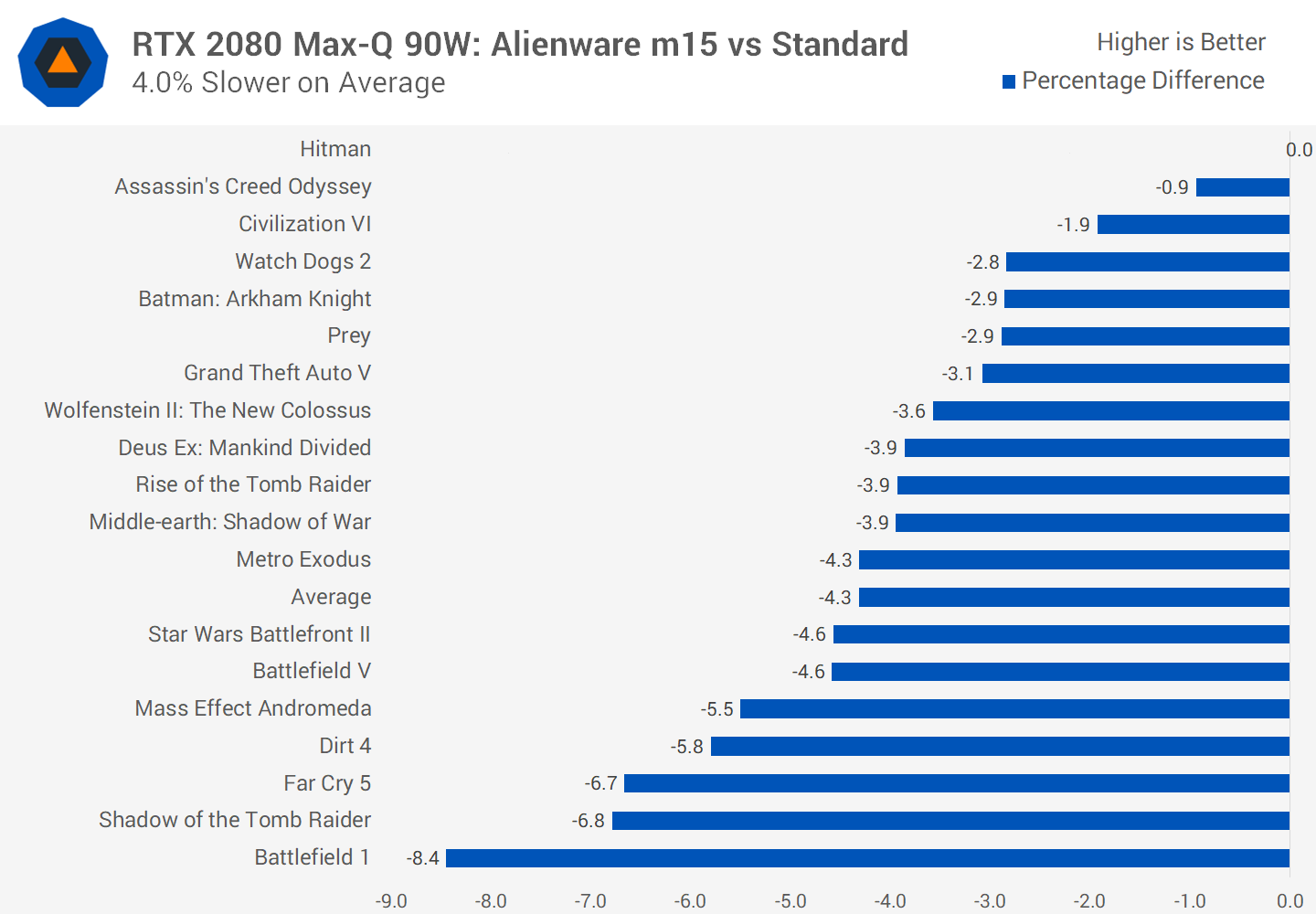
What this means is the Alienware m15 in a typical usage environment on your desk is 4% slower on average than the 'maximum' performance the RTX 2080 Max-Q 90W variant is capable of. However it is possible to get the full performance of the 2080 Max-Q if you raise the base of the laptop slightly, which gives the bottom vents less restricted access to airflow. You don't have to change any other laptop settings, just make this physical adjustment. If you do this, the cooler performs much better and you get the full performance of the GPU inside. It's not a very practical solution and we feel this issue could have been resolved with a better optimized series of vents around the design.
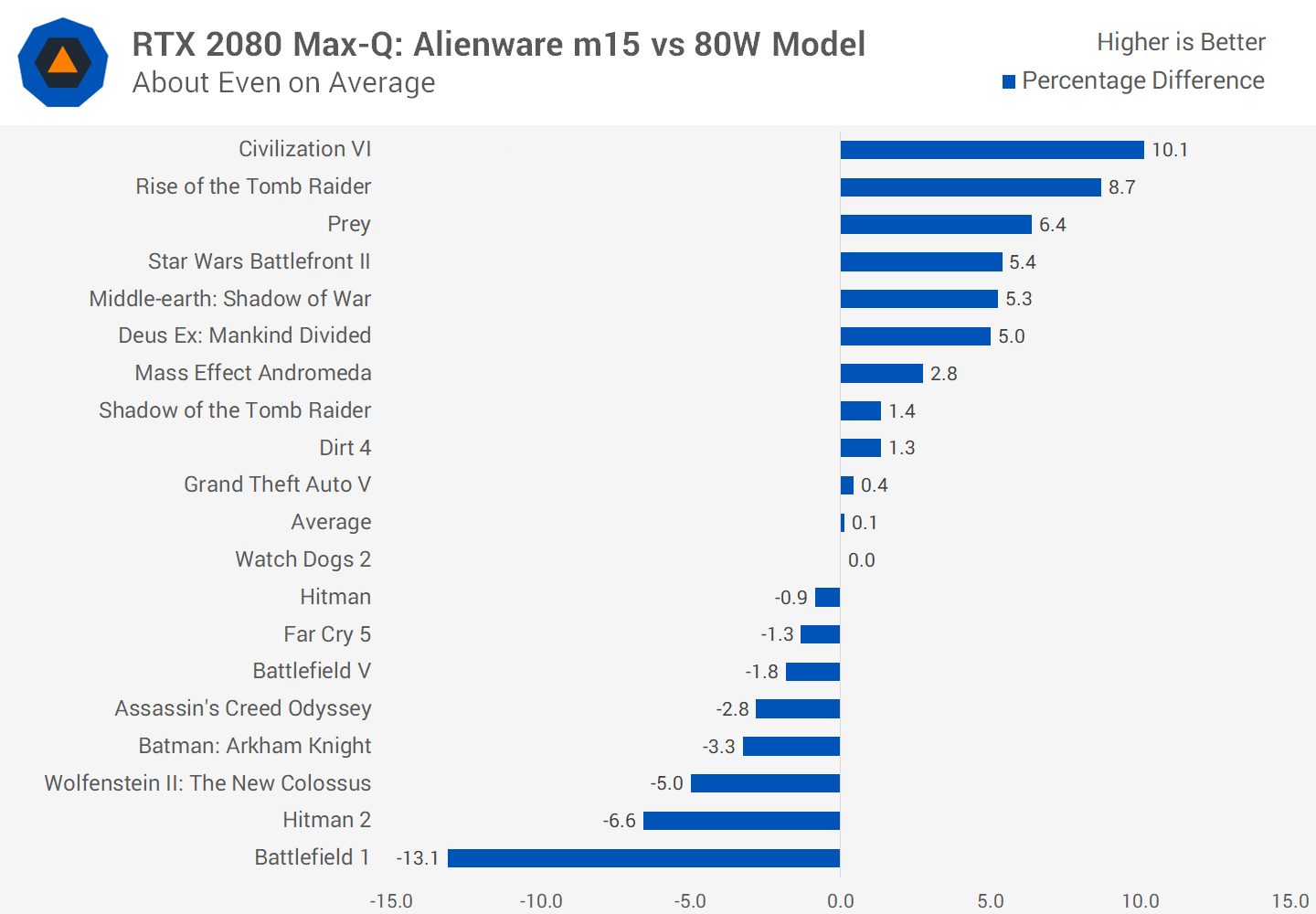
For the rest of this data, we're showing how the Alienware m15 performs without the workaround because we feel this is how most people will use the laptop. The good news is that when sitting on your desk normally, the Alienware m15 performs about the same as the RTX 2080 Max-Q 80W variant. So it's not choked to the level that it performs below a typical RTX 2080 Max-Q, it's merely the same.

With the Alienware m15 performing roughly the same as an 80W RTX 2080 Max-Q, the margins between this laptop and other GPUs is pretty similar. It's ~10% faster than the RTX 2070 Max-Q, so if you are tossing up between the various Alienware m15 GPU configurations, this is something that will interest you.

The other available GPU is the RTX 2060. Here the RTX 2080 Max-Q is 16% faster on average, although it doesn't win in every game. For example, Hitman 2 is unusually slow with the Alienware m15 compared to the average result for other laptops we've tested. On the other hand, there is a significant lead in games like Shadow of War, where the 2080 Max-Q is more than 30% faster.

The previous GTX-based Alienware m15 was available with the GTX 1070 Max-Q inside. This new RTX 2080 Max-Q model is a decent 24% faster on average, which is an impressive improvement from the same sort of cooler design and form factor. The RTX 2080 Max-Q models are a lot more expensive however.

Finally we have the comparison between the RTX 2080 Max-Q and the standard GTX 1070 for laptops. The RTX 2080 Max-Q is 6% faster on average but it's a bit of a mixed bag: it wins in some titles, and loses in others. It's definitely not a situation where the RTX 2080 demolishes the GTX 1070, which is the case when comparing the desktop variants of these GPUs.
Cooling Setup: Could use some work
Here is the data showing the Alienware m15's cooling solution isn't up to scratch for the hardware inside. GPU temperatures are okay without being great, 84 degrees Celsius is fine for most gaming laptops. But it's the CPU temperatures that are seriously crazy, with the m15 hitting 99 degrees during a Watch Dogs 2 gaming session. Any time a laptop is up around that 100 degree mark, you're going to get throttling.
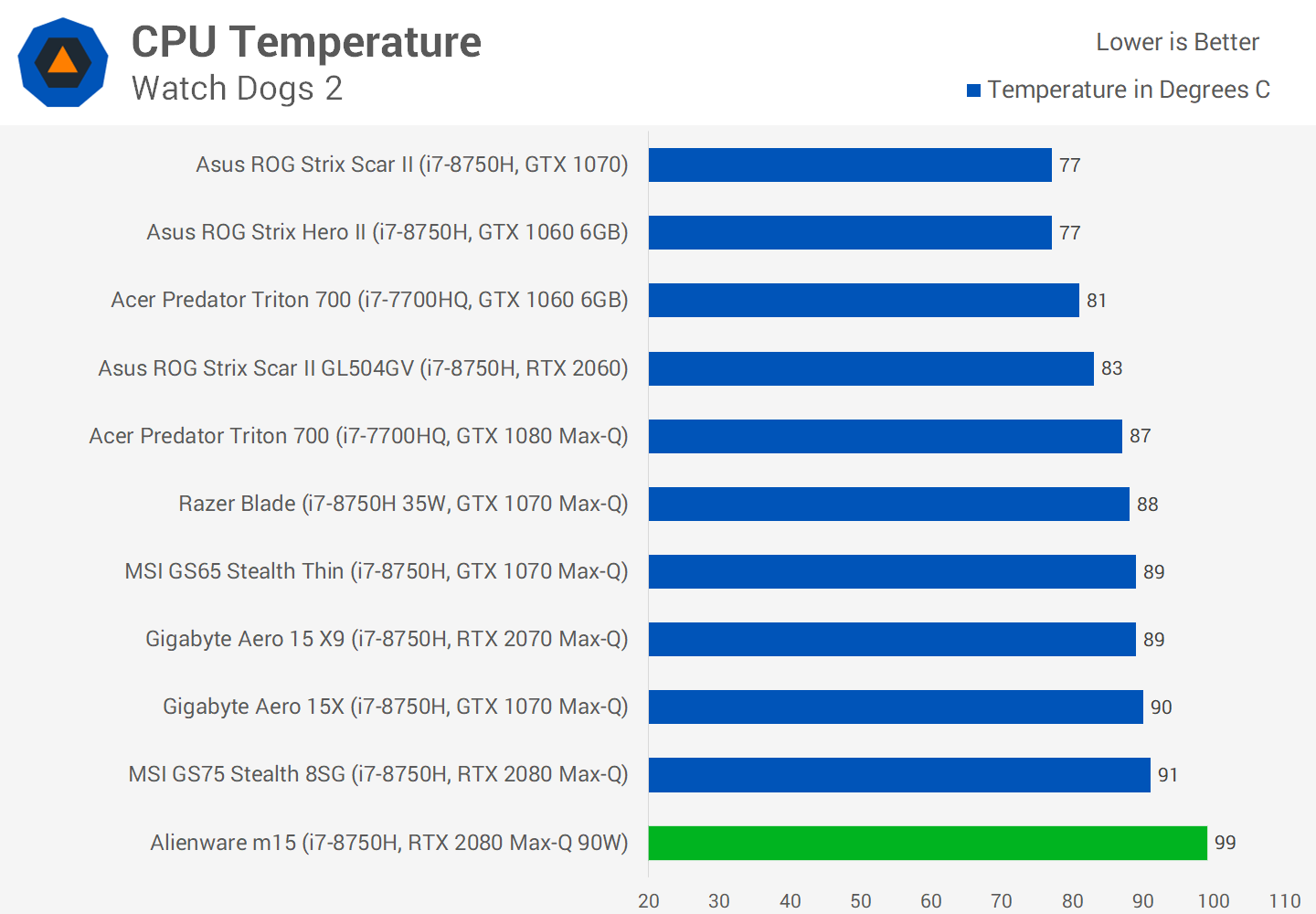

So with this laptop it's not the GPU but mostly CPU throttling to be concerned about. Raising the laptop's base which provides more airflow to the choked cooler (without increasing fan speed) sees a significant 7 degree drop on the CPU and a similar drop on the GPU, but it's more than that: CPU clock speeds also increase by 500 MHz or so across all six cores.
It's a huge difference and just shows how in a standard usage case this cooler cannot keep up with the demands of the high-TDP parts inside. Without that CPU bottleneck we see the full performance of these components.
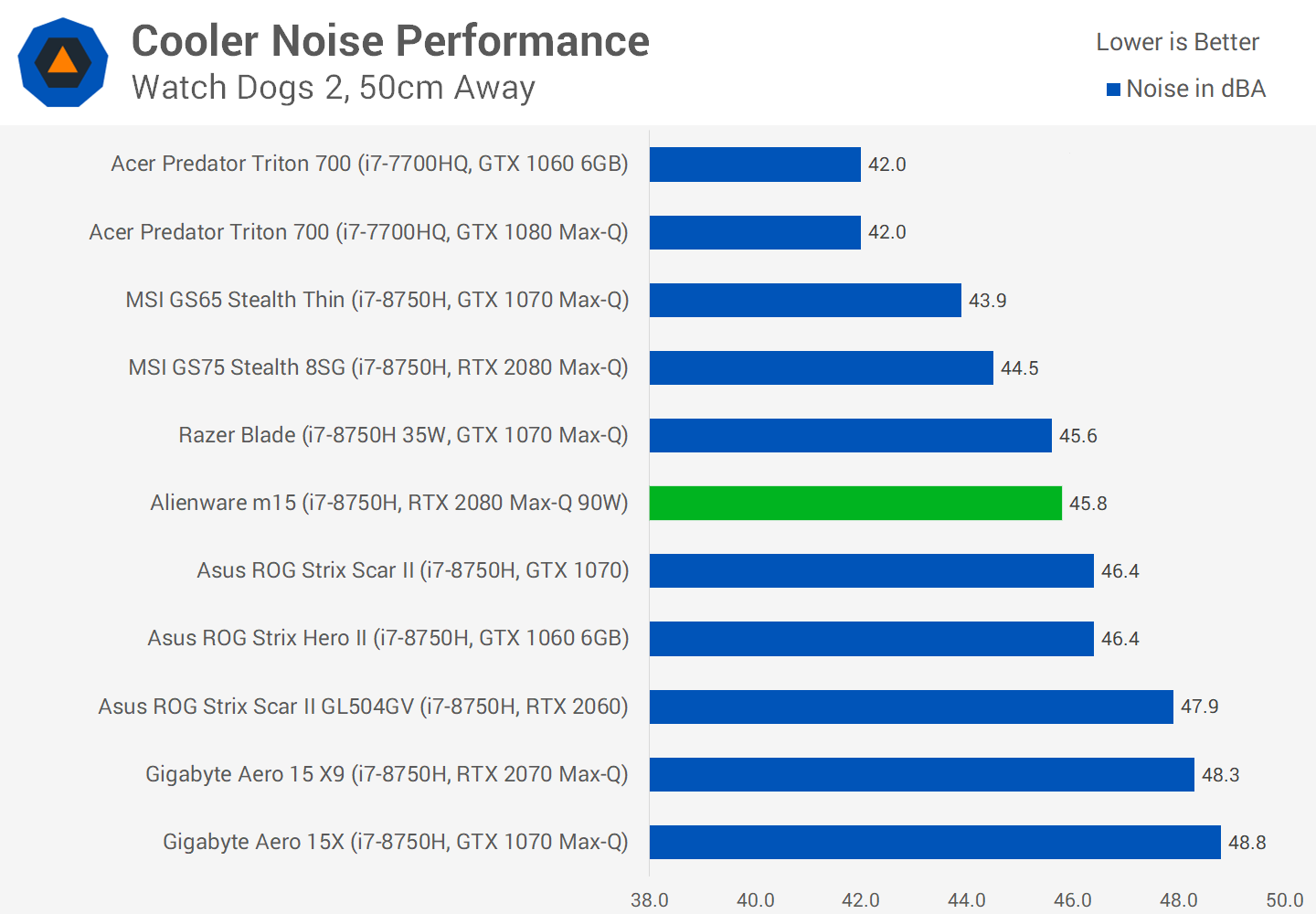
And it's no surprise why the Alienware m15 can't push the fan any faster: we're already sitting at 46 dBA during a gaming load, which is on the higher end for a gaming laptop. So this system is both hot and loud, giving basically no room to move. If you're hoping to overclock this system... well, there's zero headroom for that.
Those that like to undervolt and replace the thermal compound with something like liquid metal may be able to get more out of this cooler design. It's also possible that the lower-tier GPUs like the RTX 2060 won't run into this same thermal bottleneck but it's hard to say for sure.
Storage, Battery & Display
Moving on to storage performance, our Alienware m15 came equipped with a 512GB SK Hynix PC401 SSD which performed pretty well, no real complaints here. It's not the absolute fastest gaming laptop SSD we've seen, particularly for sequential workloads, but it's adequate for most people.
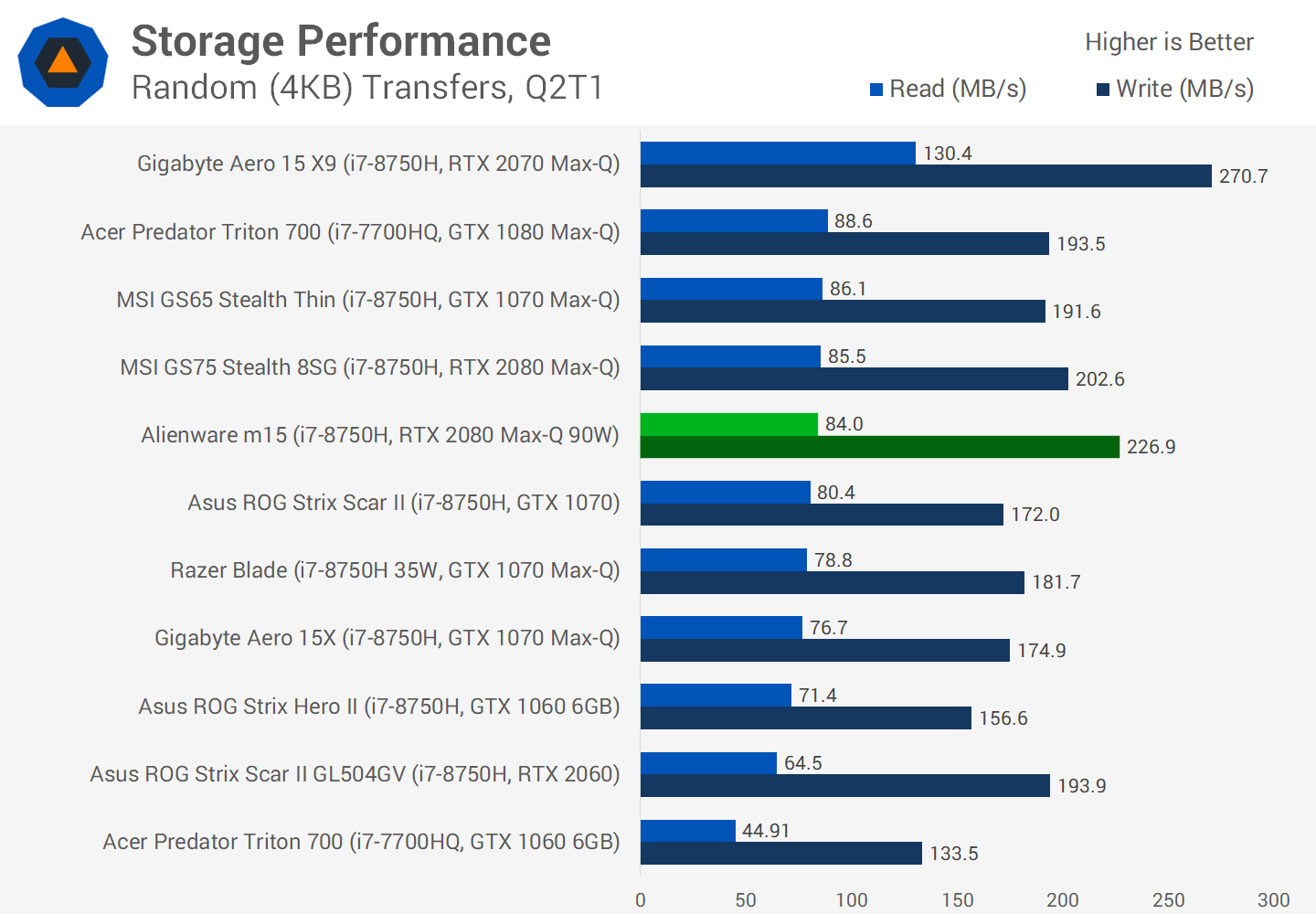

Battery life was pretty disappointing though. The m15 comes with two battery options, if you want a 1TB hard drive inside, you get just a 60 Wh cell, which was the case with our review unit. If you forgo the 2.5-inch drive bay slot you can increase the battery capacity to 90 Wh, which no doubt delivers better results than the disappointing sub-4 hour run time in our video playback test.
Given that internally you get two M.2 slots, one of which was free in our unit and both of which are easily user accessible, we think most buyers would be better off opting for the 90 Wh model and using cheap M.2 storage options to get extra space if necessary. Especially if you want better battery life which we feel is important in a portable-oriented system like the m15.

Like a lot of similar laptops, Alienware is using a 15.6-inch 1080p IPS with a maximum refresh rate of 144 Hz. The combination of IPS and 144 Hz works really well for gamers. The high refresh rate is perfect for the RTX 2080 Max-Q that often pushes frame rates above 100 FPS at 1080p, so this is the display option you'll want to choose.
A lot of the basic characteristics are good: 300 nits of peak brightness is fine for indoor use, especially as that's combined with excellent viewing angles. A contrast ratio of 1200:1 is also great for this type of display, however we did experience a bit of IPS glow when viewing dark or black content. Not a huge issue, but something to keep in mind.
The bigger problem with this display is the lack of color calibration. The default white point is around 8000K which is far too cold, giving the display a blue tone. In fact there doesn't appear to be any calibration here whatsoever, at least not to the sRGB standard, as deltaE averages across the board are above 4.0.
Normally for gaming laptops we don't find calibration to be a big issue, but with the Alienware m15 it's a little different. DeltaEs above 4.0 are higher than many other laptops, particularly the 5.7 greyscale deltaE average, so this display is particularly poorly calibrated. And on top of this, many competitors to this system - such as the MSI GS65 and Gigabyte Aero 15 - do come with factory calibrated displays. So while it may not bother every buyer, calibration is something you don't get here as part of the package.
Closing Remarks
Overall, we're in two places with the Alienware m15. This is clearly their best laptop design. It's thinner and lighter than regular Alienware laptops, and that's a step in the right direction. As most gaming laptop competitors have this sort of system on the market, coming from the chunky Alienware beasts, this focus on portability is welcome from a design perspective.
On the other hand, we feel Alienware has failed to execute in terms of some of the performance characteristics. In particular, the cooler simply isn't powerful enough to cool both the Core i7-8750H and RTX 2080 Max-Q without throttling. There's an airflow issue causing lower than expected performance when both the CPU and GPU are utilized, like in games. This becomes less forgiving when you consider the m15 is larger and heavier overall than direct competitors.
However, performance is not bad and it's still around the mark of a typical RTX 2080 Max-Q laptop. But it could have been better, especially as this laptop includes the 90W variant of the GPU, it could have been the best of its features. Future versions of this laptop will no doubt need a cooling layout revision.
Build quality is great on the m15 but there's other odds and ends that aren't as polished. The display isn't calibrated and doesn't pack a slim bezel design. The keyboard and trackpad are okay without being amazing. The default option is a small 60 Wh battery and you have to pay to get a larger one.
We don't see what the Alienware m15 does better than a laptop like the MSI GS65. There's no key feature that might get me to recommend it in some situations, like better value or a unique design, or top-tier performance. In every metric we've tested, this system is beaten by the excellent MSI option which is basically the same price for an equivalent configuration, regardless of which RTX GPU you choose. And this is without discussing the overall value proposition of Nvidia's Turing laptops.
The Alienware m15 is a great step forward for the company, but it ultimately doesn't get our recommendation. It's hard to create the perfect portable system on the first attempt, and many competitors have simply been doing this for longer and have more refined, better options today that you should consider instead.
The Alienware starts at $1,275 with a GTX 1060 GPU and 8GB DDR4, while the fully fledged RTX 2080 model that we tested is about $3,000.
